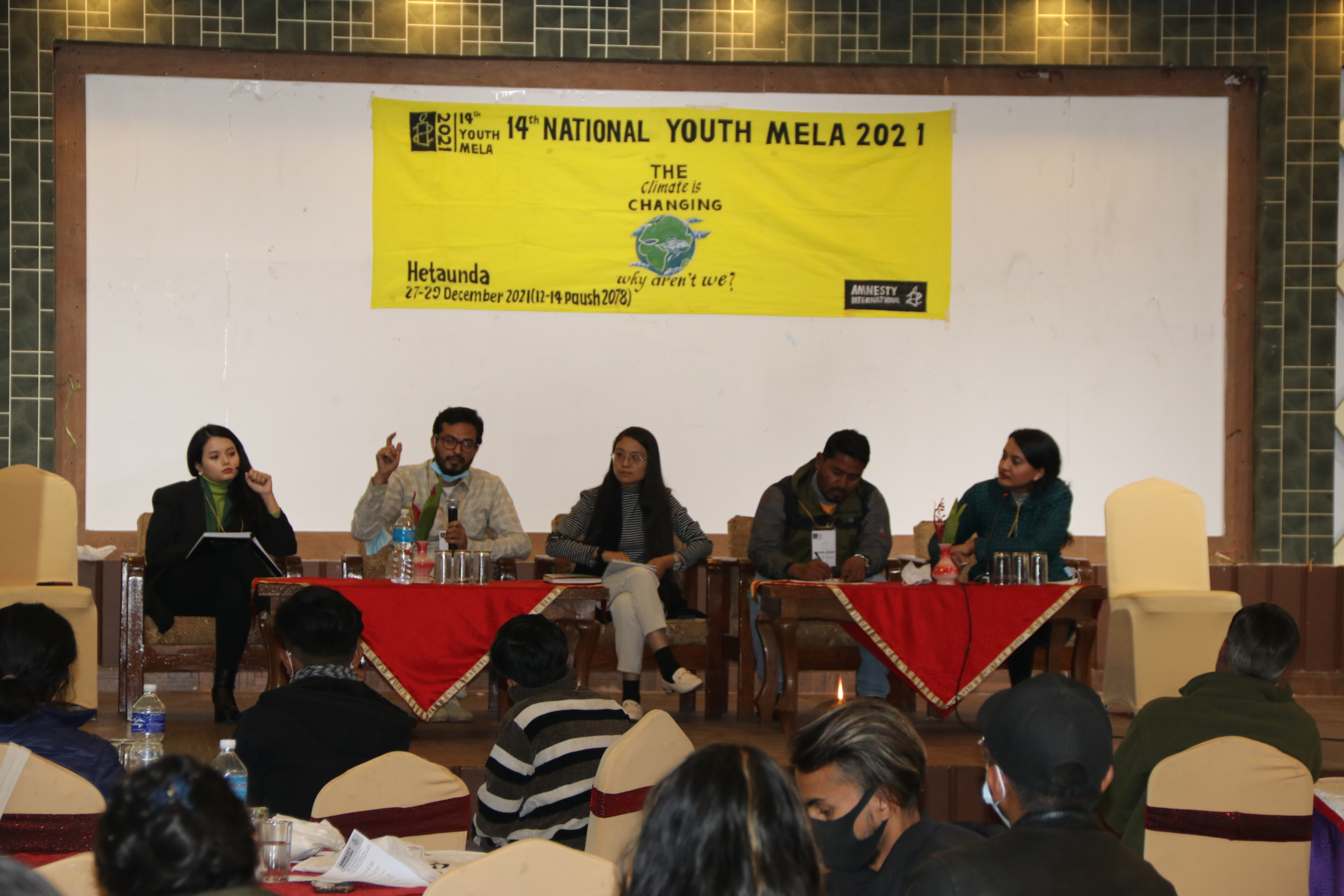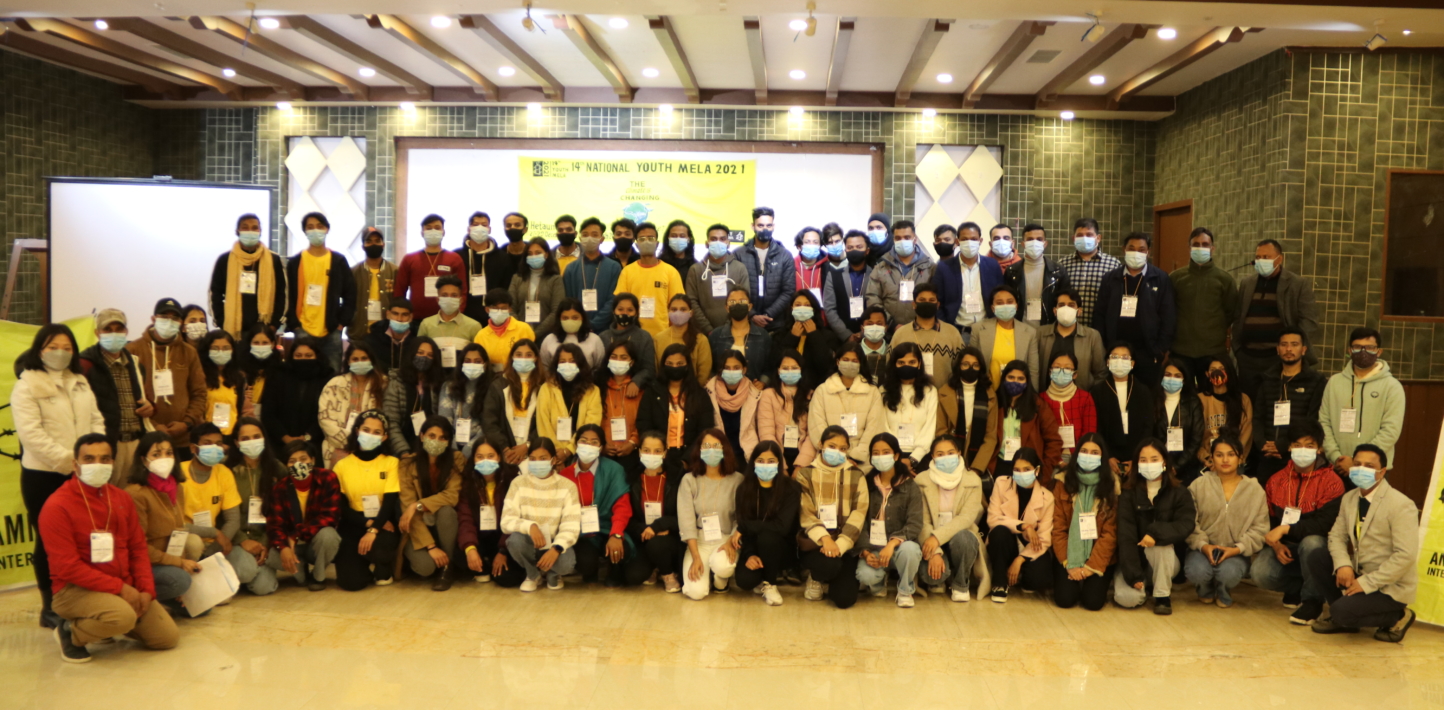Amnesty International Nepal organized the 14th edition of the Youth Mela in Hetauda, Makawanpur from 27 – 29 December 2021 under the banner title ‘CLIMATE JUSTICE: The Climate is Changing, Why Aren’t We?’
Amnesty Nepal’s Chair Bikram Dhukuchhu and honorable House of Speaker of Bagmati Province Sanu Kumar Shrestha, who was also the chief guest of the opening event, inaugurated the three-day Youth Mela. Over 100 youths representing more than 50 youth networks and supporters of Amnesty Nepal based in different parts of the country attended the Mela.
Amnesty International Nepal has been organizing the Youth Mela since 2006 to sensitize and empower its youth members and volunteers on different issues of human rights. Over the past 14 years, it has so far imparted such trainings to over 1500 young activists.
Addressing the participants during the inaugural session, Speaker Shrestha said, “Youths are the leaders of today, not tomorrow. Many things have changed today from when I was young.” He added that Nepal is now federal democratic republic, and youths need to ponder over what the country is lacking in terms of good governance and human rights and contribute to bringing transformations.
“We organize the Youth Mela every year to educate our members on how Amnesty International undertakes its human rights work and how its members, supporters and volunteers contribute to promote and protect human rights across the world,” Amnesty Nepal’s Chairperson Bikram Dhukuchhu said during the inauguration.
The Youth Mela sensitized the participants on the role of youths in tackling climate change and co-relation between climate change and human rights. In addition, it enhanced their knowledge and skills on various human rights issues including transitional justice, LGBTQI, and disability issues.
A panel discussion that consisted of climate justice activists and youth leaders – Shreya KC, Prakriti Bhattarai Basnet, Shail Shrestha and Om Prakash Chaudhary – was the highlight of the Youth Mela, which discussed the co-relation between climate change and human rights, and the role of youths to confront the world that is now plagued by human-induced climate change.

Panel Discussion
Amnesty Nepal’s Director Nirajan Thapaliya and former acting Chair Raju Sarkar jointly facilitated a session on the basic concepts of human rights alongside the roles of states, civil society organizations, media, and international community. They also dwelt on the key human rights issues of in Nepal.
Amnesty Nepal’s Campaign Coordinator Ashmita Sapkota introduced Amnesty International and Amnesty International Nepal to the participants including by sharing some of the key human rights impacts made. She also joined Baburam Pant, campaigner based at the Amnesty International’s South Asia Regional Office, to facilitate a session on different kinds of campaigns that Amnesty International has been undertaking on various issues of human rights. She informed the participants about the rights of migrant workers, gender justice, truth, justice and reparations as the priority area of works for Amnesty Nepal at the moment.
In a session on human rights education, Human Rights Education Officer Arpana Shrestha interacted with the youth members. She informed that Human Rights Education is a key component for Amnesty aiming at empowering people through fostering knowledge, skills and attitudes consistent with internationally recognized human rights principles.
Amnesty Nepal’s acting General Secretary Bipin Budhathoki shared the prospects and opportunities for youth members to accelerate human rights movement. His session motivated the participants to proactively engage in the activism with Amnesty and to learn, build and claim leadership roles within the organization.
LGBTQI activist Rukshana Kapali sensitized the participants on Sexual Orientation, Gender Identity and Expression, and Sex Characteristics (SOGIESC) issues. Her session made the participants aware of different sexual orientation and gender identities.
Gita Rasaili shares the story of her loss and suffering and the struggle for justice in Nepal. Her story inspired young activists to remember the history and stand in solidarity with the victims’ struggle for justice.
Federation of Nepali Journalist (FNJ) Chairperson Bipul Pokhrel interacted with the participants on “freedom of expression as a fundamental human right”. Dwelling on the current situation of press freedom in Nepal, he took a critical note of the proposed legislations on media and social media that are purportedly intended to curtail the freedom of expression.
The youth participants at the Mela also took a photo action demanding justice and reparation for the victims and families of war crimes in Afghanistan.
The Mela concluded on 29 December with reflection and feedback from the participants and the distribution of certificates of participation. The participants expressed that the Mela was empowering and that they felt motivated and inspired to take actions at individual levels for human rights changes.
To check out the glimpse of the Youth Mela, please click here.


